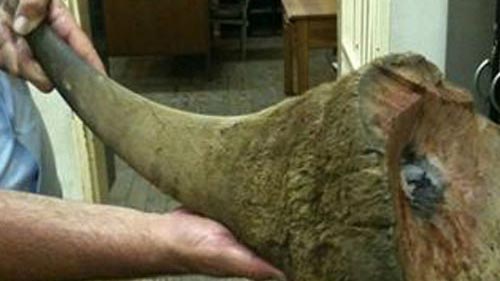Ruling to lift rhino horn sales ban sends mixed messages to Vietnamese
The Vietnamese leader of a campaign to stop demand for rhino horn says the recent South African court ruling to lift the ban on the domestic sale of rhino horn in the country would make Vietnamese consumers more convinced of the medical effects of the horn.
Campaign Coordinator at WildAid Vietnam and Program Development Coordinator at Change, Chau Nhi, says the ruling will make her NGO’s efforts to decrease demand for rhino horn laughable in the eyes of many Vietnamese people.
“If they know that SA has lifted the ban, they’ll come back and question and laugh at us,” Chau Nhi said.
She said the mix of messages about rhino horn from the pro-trade and anti-trade movements is “fooling around” with Vietnamese people’s attitudes and beliefs.
“Our campaign goal is to end the horn demand in Vietnam so lifting such a ban would cause much challenge to our work,” she said.
Three South African judges in November lifted a domestic ban on the sale of rhino horn in the African country.
 |
Judges Francis Legodi, Vivian Tlhapi and Myron Dewrance set aside the moratorium, which came into effect early in 2009, because of “substantial non-compliance” with the consultative and participatory process.
Two South African private rhino owners - John Hume, who is the world’s biggest private owner of rhino, and Johan Kruger - had launched the legal action that was decided in the Pretoria High Court.
The Minister of Environmental Affairs, Mrs Edna Molewa, has appealed the judgment, suspending the operation and execution of the judgment, according to a statement on the department’s website.
Chau Nhi said rhino horn consumers in Vietnam know that using and trading the horn is illegal. “We’re opposed to legalizing the trade as it would potentially stimulate the demand for rhino horn.”
Vietnam is a signatory to the CITES convention which makes the commercial trade of rhino horn illegal.
In South Africa 1215 rhinos were killed illegally for their horns in 2014 while 2015’s figures from August 27 were 749.
Chau Nhi believes organized crime is responsible for the trade.
The Vietnamese wildlife campaigner doesn’t understand how authorities would be able to control a legal trade if they can’t control an illegal trade. Corruption and fake certificates would be “very hard to sort out.”
Demand for rhino horn in Vietnam is very high, she said. “Many people around us are using it and it’s easy to find them. It’s very easy to get.”
People talk about rhino horn openly with friends but are “skeptical” about talking publicly. In other words the word on the street about the trade is quite different to what is being said in the Vietnamese media.
She said 10 rhino horn users had responded recently within two hours to a Facebook post from the NGO looking for horn users willing to be interviewed by a journalist. They didn’t want to be identified or photographed however.
The campaign is finding it “very hard” to convince the public that rhino horn has the medical efficacy of finger nails.
“No matter how much we talk to them they still use it.”
The campaign is having some success with raising awareness with young people, but it is failing to reach the main target public who are Vietnam’s top CEOs, the rich middle aged and the super rich.
“They are the ones we really want to tackle but there’s no way to deal with it yet.”
One of the campaign’s main three goals is to support and strengthen enforcement efforts but the campaign failed to persuade the customs at Ho Chi Minh City’s Tan Son Nhat airport, Hanoi’s Noi Bai airport and Haiphong’s seaport to use trained sniffer dogs.
Rhino horn use doesn’t just occur in the main cities; medium sized cities and provinces such as Vinh, Haiphong and Nghe An, and areas in the Mekong Delta have large numbers of users, she said.
Many South Africans mainly rhino horn owners who stand to profit from legalizing the trade in the horn want the ban lifted and blame it for the high price.
One anti-ban advocate without a conflict of interest is Peter Britz, an expert in illegal South African abalone syndicates with Rhodes University in Grahamstown in Eastern Cape Province. He says the courts lifting of the ban was based on a technical issue not on the merits or rationality of the ban on local trade.
“The court ruling is a very interesting one as it was a technical ruling stating the ban, which substantially affected rhino owners rights, did not fulfill legal minima for consultation with affected parties,” Britz said.
“It needs to be recognized that rhinos are not ‘wildlife’ for private rhino owners - they are bred (farmed) for sale (harvest).
“So the imposition of the ban effectively reduced both the asset value to the privately owned rhino as the demand and price of live traded rhinos decreased and the issue of rhino hunting permits for game farms dried up.
“With sunk capital of millions in each rhino, and some facing possible financial ruin, the moral hazard created is that rhino owners sell the horns to the illegal trade illicitly.”
